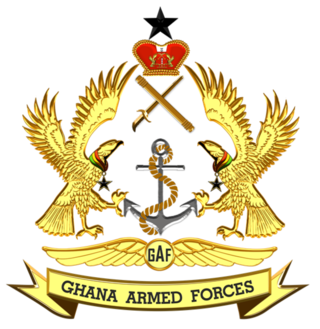
The Ghana Armed Forces (GAF) is the unified armed force of Ghana, consisting of the Army (GA), Navy (GN), and Ghana Air Force.
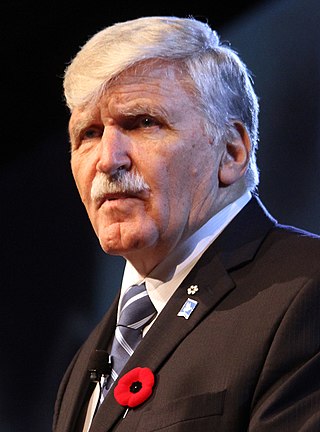
Roméo Antonius Dallaire is a Canadian humanitarian, author, retired senator and Canadian Forces lieutenant-general. Dallaire served as force commander of UNAMIR, the ill-fated United Nations peacekeeping force for Rwanda between 1993 and 1994, and attempted to stop the genocide that was being waged by Hutu extremists against the Tutsi people and Hutu moderates.

The United Nations Assistance Mission for Rwanda (UNAMIR) was established by United Nations Security Council Resolution 872 on 5 October 1993. It was intended to assist in the implementation of the Arusha Accords, signed on 4 August 1993, which was meant to end the Rwandan Civil War. The mission lasted from October 1993 to March 1996. Its activities were meant to aid the peace process between the Hutu-dominated Rwandese government and the Tutsi-dominated rebel Rwandan Patriotic Front (RPF). The UNAMIR has received much attention for its role in failing, due to the limitations of its rules of engagement, to prevent the Rwandan genocide and outbreak of fighting. Its mandate extended past the RPF overthrow of the government and into the Great Lakes refugee crisis. The mission is thus regarded as a major failure.

The Rwandan genocide occurred between 7 April and 15 July 1994 during the Rwandan Civil War. During this period of around 100 days, members of the Tutsi minority ethnic group, as well as some moderate Hutu and Twa, were killed by armed Hutu militias. The most widely accepted scholarly estimates are around 500,000 to 662,000 Tutsi deaths.
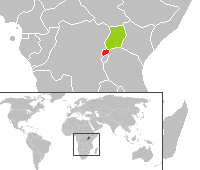
The United Nations Observer Mission Uganda–Rwanda (UNOMUR) was a peacekeeping mission established by the United Nations Security Council in Resolution 846 and lasted from June 1993 to September 1994. Its mission was "to monitor the border between Uganda and Rwanda and verify that no military assistance was being provided across it". It was based in Kabale, Uganda and its mandate thus covered 193 miles of border. Countries contributing to UNOMUR included Bangladesh, Botswana, Brazil, Hungary, the Netherlands, Senegal, Slovakia and Zimbabwe.
The Arusha Accords, officially the Peace Agreement between the Government of the Republic of Rwandaand the Rwandan Patriotic Front, also known as the Arusha Peace Agreement or Arusha negotiations, were a set of five accords signed in Arusha, Tanzania on 4 August 1993, by the government of Rwanda and the rebel Rwandan Patriotic Front (RPF), under mediation, to end a three-year Rwandan Civil War. Primarily organized by the Organisation of African Unity and the heads of state in the African Great Lakes region, the talks began on 12 July 1992, and ended on 4 August 1993, when the accords were finally signed.

Shake Hands with the Devil: The Failure of Humanity in Rwanda is a book by Lieutenant-General Roméo Dallaire of the Canadian Forces, with help from Major Brent Beardsley. It was first published by Random House Canada in September 2003.
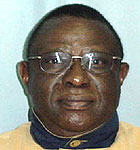
Théoneste Bagosora was a Rwandan military officer. He was chiefly known for his key role in the 1994 Rwandan genocide for which he was sentenced to life imprisonment by the International Criminal Tribunal for Rwanda (ICTR). In 2011, the sentence was reduced to 35 years' imprisonment on appeal. He was due to be imprisoned until he was 89. According to René Lemarchand, Bagosora was "the chief organizer of the killings". On 25 September 2021, he died in a prison hospital in Mali, where he was being treated for heart issues.

Opération Turquoise was a French-led military operation in Rwanda in 1994 under the mandate of the United Nations. The "multilateral" force consisted of 2,500 troops, 32 from Senegal and the rest French. The equipment included 100 APCs, 10 helicopters, a battery of 120 mm mortars, 4 Jaguar fighter bombers, 8 Mirage fighters, and reconnaissance aircraft. The helicopters laid a trail of food, water and medicine enabling refugees to escape into eastern Zaire. Opération Turquoise is controversial for at least two reasons: accusations that it was an attempt to prop up the genocidal Hutu regime, and that its mandate undermined the UNAMIR. By facilitating 2 million Rwandan refugees to travel to Kivu provinces in Zaire, Turquoise setup the causes of the First Congo War.

The assassination of presidents Juvénal Habyarimana and Cyprien Ntaryamira in the evening of April 6, 1994 was the proximate trigger for the Rwandan genocide, which resulted in the murder of approximately 800,000 Tutsi and a smaller number of moderate Hutu. The first few days following the assassinations included a number of key events that shaped the subsequent course of the genocide. These included: the seizing of power by an interim government directed by the hard-line Akazu clique; the liquidation of opposition Hutu politicians; the implementation of plans to carry out a genocide throughout the country; and the murder of United Nations peacekeepers, contributing to the impulse of the international community to refrain from intervention.

The failure of the international community to effectively respond to the Rwandan genocide of 1994 has been the subject of significant criticism. During a period of around 100 days, between 7 April and 15 July, an estimated 500,000-1,100,000 Rwandans, mostly Tutsi and moderate Hutu, were murdered by Interahamwe militias.
Jacques-Roger Booh-Booh is a Cameroonian politician and diplomat. He was the Minister of External Relations of Cameroon from 1988 to 1992 and the head of United Nations Assistance Mission for Rwanda (UNAMIR). He has 4 kids and one grandson name Sören Lemarchand Booh
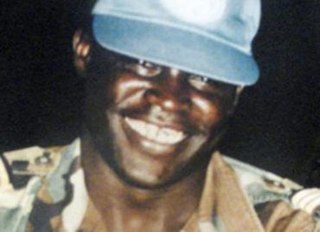
Mbaye Diagne was a Senegalese military officer who served in Rwanda as a United Nations military observer from 1993 to 1994. During the Rwandan genocide he undertook many missions on his own initiative to save the lives of civilians.

The Amahoro Stadium, officially known as Amahoro National Stadium, is a multi-purpose stadium in the Gasabo district of Kigali, Rwanda. With a capacity of 25,000, it is the largest stadium in Rwanda and hosts football matches, concerts, and public events. The football clubs Armée Patriotique Rwandaise F.C. and Rayon Sports F.C. are the tenants. The venue is also sometimes used for rugby union.
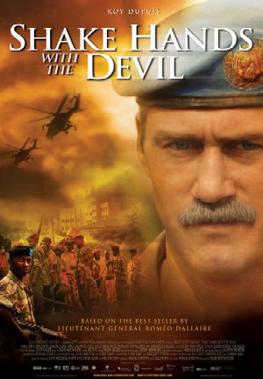
Shake Hands with the Devil is a 2007 Canadian war drama film starring Roy Dupuis as Roméo Dallaire, which premiered at the Toronto International Film Festival in August 2007. Based on Dallaire's autobiographical book Shake Hands with the Devil: The Failure of Humanity in Rwanda, the film recounts Dallaire's harrowing personal journey during the 1994 Rwandan genocide and how the United Nations didn’t heed Dallaire's urgent pleas for further assistance to halt the massacre.

The Ghana Army (GA) is the main ground warfare organizational military branch of the Ghanaian Armed Forces (GAF). In 1959, two years after the Gold Coast obtained independence as Ghana, the Gold Coast Regiment was withdrawn from the Royal West African Frontier Force, and formed the basis for the new Ghanaian army. Together with the Ghanaian air force (GHF) and Ghanaian navy (GN), the Ghanaian army (GA) makes up the Ghanaian Armed Forces (GAF), controlled by the Ghanaian Ministry of Defence (MoD) and Central Defence Headquarters, both located in Greater Accra.
Stefan Steć was a major of the Polish Armed Forces. In 1994, he served as a peacekeeper in the UNAMIR forces in Rwanda under general Roméo Dallaire. For his dedication in saving lives during Rwandan genocide at the risk to his own, he was awarded the Cross of Merit for Bravery by Polish President Lech Wałęsa. He died at the age of 40 due to complications from posttraumatic stress disorder.

Colonel Luc Marchal is a retired officer of the armed forces of Belgium. He is known for being the senior officer in the Belgian peacekeeping contingent during the 1994 Rwandan genocide, as well as the United Nations Assistance Mission for Rwanda (UNAMIR) sector commander for the capital Kigali.

So far India has taken part in 49 Peacekeeping missions with a total contribution exceeding 200,000 troops and a significant number of police personnel having been deployed and more than 160 Indian peacekeepers have paid the ultimate price in service to peace, losing their lives serving under the UN flag as of September 2022. In 2014 India is the third largest troop contributor country [TCC] with 7,860 personnel deployed with ten UN Peacekeeping Missions of which 995 are police personnel, including the first Female Formed Police Unit under the UN. Recently Indian Peacekeepers were lauded by the UN for their efforts in preventing a carnage in the South Sudan conflict which resulted in the death of two of its soldiers.

The 1st Paratroopers Battalion or 1 PARA was a military formation of the Belgian Army and part of the Paracommando Brigade from 1946 to 2011. Its regimental traditions, including its badge and motto, were heavily influenced by the experience of many of its personnel in British SAS during the Second World War. The battalion was disbanded on 1 July 2011.














